(Exodus 12:12) Who Really Killed the Firstborn in Egypt?
“For I will pass through the land of Egypt this night, and will smite all the firstborn in the land of Egypt, both man and beast; and against all the gods of Egypt I will execute judgment: I am the LORD.” (Exodus 12:12)
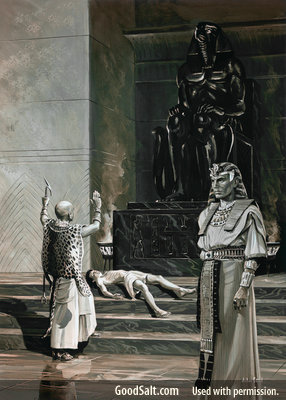 When reading this verse at face value most come to the conclusion that God is the one who directly killed all the firstborn in Egypt. The verse even says this is God’s judgment, but most skip over the fact that this judgment is against “the gods of Egypt.” So what does this judgment against the gods of Egypt have to do with the killing of all the firstborn? The answer lies is the meaning of God’s judgment.
When reading this verse at face value most come to the conclusion that God is the one who directly killed all the firstborn in Egypt. The verse even says this is God’s judgment, but most skip over the fact that this judgment is against “the gods of Egypt.” So what does this judgment against the gods of Egypt have to do with the killing of all the firstborn? The answer lies is the meaning of God’s judgment.
How Does God Judge?
Many view God’s judgment as Him lashing out in wrath against those who do not do what He says. But that is not quite what we see in Scripture, especially in the context of the plagues of Egypt. Let’s notice verse 23:
“For the LORD will pass through to smite the Egyptians; and when he seeth the blood upon the lintel, and on the two side posts, the LORD will pass over the door, and will not suffer (permit) the Destroyer to come in unto your houses to smite you.” (Exodus 12:23)
So who is it that really killed the firstborn? The Destroyer. God’s judgment was simply to choose whether or not to permit the Destroyer to enter the house. Of course God’s choice was to prevent the Destroyer access, but God accepted the free choice of the individual family. If the blood was on the doorpost, God accepted their free choice and did not permit the Destroyer to enter. If there was no blood, then God accepted their free choice and did not prevent the Destroyer to enter.
This is how God judges. Every person receives the free choice to judge (decide) their own fate. Notice what Paul said to a group of unbelieving Jews:
“Then Paul and Barnabas waxed bold, and said, It was necessary that the word of God should first have been spoken to you: but seeing ye put it from you, and judge yourselves unworthy of everlasting life, lo, we turn to the Gentiles.” (Acts 13:46)
Those who did not spread the blood upon their doorposts chose to trust in the gods of Egypt instead of the one true God. All false gods are an invention of Satan. He gets mankind to worship and trust these false gods in order to bring them to destruction.
The Real Destroyer
Many refer to the Destroyer mentioned in Exodus 12:23 as “the destroying angel”, however, this destroying angel does not work for God. The destroying angel is Satan (or at least one of his angels). Referring to the wondering Israelites as they left Egypt, Paul writes:
“Neither let us tempt Christ, as some of them also tempted, and were destroyed of serpents. Neither murmur ye, as some of them also murmured, and were destroyed of the Destroyer.” (1 Corinthians 10:9-10)
Here Paul refers to the Destroyer again. Notice verse 10 again as it is translated in The Good News Bible:
“We must not complain, as some of them did--and they were destroyed by the Angel of Death.”
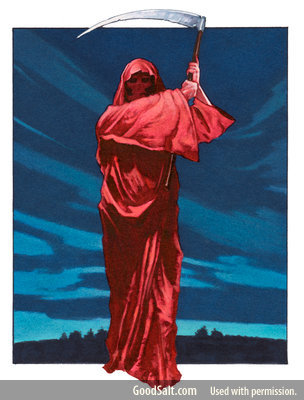 Here we see the Destroyer as “the Angel of Death.” Do you really think one of God’s good angels is a killer? Would a God of righteousness create an angel for the purpose of destroying and killing? Not according to Scripture:
Here we see the Destroyer as “the Angel of Death.” Do you really think one of God’s good angels is a killer? Would a God of righteousness create an angel for the purpose of destroying and killing? Not according to Scripture:
“In the way of righteousness is life; and in the pathway thereof there is no death.” (Proverbs 12:28)
There is no death in righteousness. Here is how the International Standard Version translates it:
“In the pathway to righteousness there is life, and in that lifestyle there is no death.” (Proverbs 12:28)
The lifestyle of righteousness does not produce, nor execute death. Paul says, “The last enemy that shall be destroyed is death” (1 Corinthians 15:26). How can death be an enemy that will be destroyed if it is part of God’s righteousness? God has clearly proclaimed:
“Lift up your eyes to the heavens, and look upon the earth beneath: for the heavens shall vanish away like smoke, and the earth shall wax old like a garment, and they that dwell therein shall die in like manner: but My salvation shall be forever, and My righteousness shall not be abolished.” (Isaiah 51:6)
If death were part of God’s righteousness, and His righteousness will not be abolished, then there’s no way death could be abolished (destroyed).
The Greek word Paul uses for “destroyer” in 1 Corinthians 10:10 is ὀλοθρευτής (olothreutés) which means “venomous serpent.” Who is this venomous Serpent?
“And the great dragon was cast out, that old Serpent, called the Devil, and Satan, which deceiveth the whole world: he was cast out into the earth, and his angels were cast out with him.” (Revelation 12:9).
In Revelation 9:11 we read about "the angel of the bottomless pit, whose name in the Hebrew tongue is Abaddon, but in the Greek tongue hath his name Apollyon." Abaddon means, “the destroyer,” and Apollyon means, “one that exterminates.” This is the very character of Satan himself:
“Be sober, be vigilant; because your adversary the devil, as a roaring lion, walketh about, seeking whom he may devour.” (1 Peter 5:8)
Commenting on 1 Corinthians 10:10, Cotton Mather (1663-1728) writes:
“It is said of the Israelites, in 1 Cor. 10.10. They were destroyed of the destroyer. That is, they had the Plague among them. ‘Tis the Destroyer, or the Devil, that scatters Plagues about the World.” (Cotton Mather, The Wonders of the Invisible World, p. 52)
Killing and Destruction Fits the Devil’s Evil Character
“Ye are of your father the devil, and the lusts of your father ye will do. He was a murderer from the beginning, and abode not in the truth, because there is no truth in him. When he speaketh a lie, he speaketh of his own: for he is a liar, and the father of it.” (John 8:44)
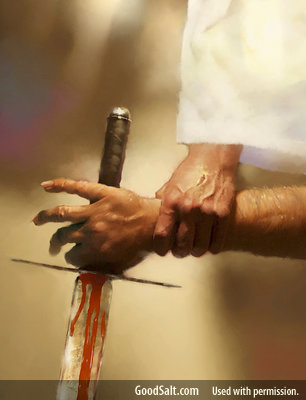 In the King James Version of Luke 9:56 Jesus (who is the express image of the Father) is quoted as saying: "... For the Son of man (the Messiah) is not come to destroy men's lives, but to save them ..." In John chapter 10 Jesus explains the difference between His character and Satan's:
In the King James Version of Luke 9:56 Jesus (who is the express image of the Father) is quoted as saying: "... For the Son of man (the Messiah) is not come to destroy men's lives, but to save them ..." In John chapter 10 Jesus explains the difference between His character and Satan's:
"The thief cometh not, but for to steal, and to kill, and to destroy: I am come that they might have life, and that they might have it more abundantly. I am the good shepherd: the good shepherd giveth his life for the sheep." (John 10:10, 11)
In the parable of the wheat and the tares Jesus teaches that the one who sows tares (or, weeds/difficulties in life) upon the earth is “an enemy” (Matthew 13:24-30). Clearly, Scripture teaches that all sickness, suffering, and death are work of an antagonistic power. Satan is the Destroyer; God is the Restorer. It is evil that will kill the unbelievers, not righteousness:
“Evil shall slay the wicked: and they that hate the righteous shall be desolate. The LORD redeemeth the soul of his servants: and none of them that trust in Him shall be desolate.” (Psalm 34:21-22)
In Mark 3:4 Jesus makes the distinction of doing good and doing evil by saying that to "do good" is "to save life" but to "do evil" is "to kill."
God’s Anger and Wrath is Him Giving
Mankind Over to Their Own Judgment and Fate
In Romans chapter 1 Paul writes:
“For the wrath of God is revealed from heaven against all ungodliness and unrighteousness of men, who hold the truth in unrighteousness …" (Romans 1:18)
How is God’s wrath revealed? Paul continues ...
“Wherefore God also gave them up to uncleanness through the lusts of their own hearts, to dishonour their own bodies between themselves.” (Verse 24)
“For this cause God gave them up unto vile affections …” (Verse 26)
“And even as they did not like to retain God in their knowledge, God gave them over to a reprobate mind …” (Verse 28)
For more info concerning the nature of God's wrath, see the article entitled, What is God's Wrath?
Keeping this in mind, Scripture is clear that it was evil angels attacking the Egyptians, not God’s righteous angels. God's protective hand was rejected so He gave them over to their own desires by letting loose "evil angels among them":
“They remembered not His hand, nor the day when He delivered them from the enemy. How He had wrought His signs in Egypt, and His wonders in the field of Zoan: And had turned their rivers into blood; and their floods, that they could not drink. He sent (permitted) divers sorts of flies among them, which devoured them; and frogs, which destroyed them. He gave also their increase unto the caterpiller, and their labour unto the locust. He destroyed (gave up) their vines with hail, and their sycomore trees with frost. He gave up their cattle also to the hail, and their flocks to hot thunderbolts. He cast upon them the fierceness of His anger, wrath, and indignation, and trouble, by sending (letting loose) EVIL ANGELS among them.” (Psalm 78:42-49)
Remember, according to Jesus' definitions of good and evil above, God's angels who "do good" always "save life" but Satan's angels who "do evil" are the ones who "kill."
All Power Belongs to God
We know from the Word of inspiration that all power “belongeth unto God” (Psalm 62:11) and that “there is no power but of God” (Romans 13:1). Nothing that we do (whether good or evil) is done by our own sustaining power. “For in Him we live, and move, and have our being” (Acts 17:28). Jesus said, “Without Me ye can do nothing” (John 15:5). We can’t even sin without the sustaining power of Christ “who upholds all things by the word of His power" (Hebrews 1:3). Christian author A.T. Jones wrote:
“Earthly power is the power of God, perverted by sin. The Creator so respects man's free will, that he gives him power to do that which is contrary to the divine will. This power however is limited.” (A.T Jones, American Sentinel, August 25, 1898)
In the time of Job, Satan desired to afflict Job and he said to God, “put forth Thine hand now, and touch all that he (Job) hath, and he will curse Thee to Thy face” (Job 1:11). Why does he not say, “Let me use my power to afflict Job,” and further to this, why does Satan even talk to God? If He has his own separate power, why does he not use it to undermine God’s protection of Job? Why does he need permission to touch Job? Simply because power belongs to God and there is no power but of God. This is why God replied to Satan saying, “Behold, all that he hath is in thy power” (Job 1:12). Satan perverted the power of God which was sustaining his life.
This brings us to the stories of the rod that turned to a serpent and the hand that turned to leprosy. Moses wonders how Pharaoh could ever let Israel go:
“And Moses answered and said, But, behold, they will not believe me, nor hearken unto my voice: for they will say, The LORD hath not appeared unto thee.” (Exodus 4:1)
The narrative that follows is not the mighty God of heaven showing Moses a few magicians’ card tricks to impress him. The illustrations are deeply significant, and they explain to us the process by which Pharaoh will be compelled to let Israel go. Let us note the first illustration given to Moses.
The Rod Which Turned into a Serpent
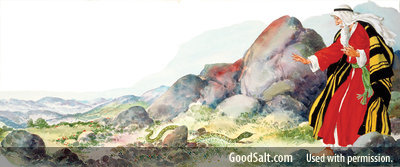 “And the LORD said unto him, What is that in thine hand? And he said, A rod. And he said, Cast it on the ground. And he cast it on the ground, and it became a serpent; and Moses fled from before it. And the LORD said unto Moses, Put forth thine hand, and take it by the tail. And he put forth his hand, and caught it, and it became a rod in his hand: That they may believe that the LORD God of their fathers, the God of Abraham, the God of Isaac, and the God of Jacob, hath appeared unto thee.” (Exodus 4:2-5)
“And the LORD said unto him, What is that in thine hand? And he said, A rod. And he said, Cast it on the ground. And he cast it on the ground, and it became a serpent; and Moses fled from before it. And the LORD said unto Moses, Put forth thine hand, and take it by the tail. And he put forth his hand, and caught it, and it became a rod in his hand: That they may believe that the LORD God of their fathers, the God of Abraham, the God of Isaac, and the God of Jacob, hath appeared unto thee.” (Exodus 4:2-5)
A rod or staff is a symbol of power. In kingly terms this is called a Sceptre. Christ is the power of God (1 Corinthians 1:24) and is at the right hand of God (Hebrews 1:3).
“Thy right hand, O LORD, is become glorious in power: Thy right hand, O LORD, hath dashed in pieces the enemy.” (Exodus 15:6)
God tells Moses that he will represent God and Aaron will be his spokesman:
“So he (Aaron) shall be your spokesman to the people. And he himself shall be as a mouth for you, and you shall be to him as God.” (Exodus 4:16)
When Moses released the rod and it fell to the ground, the power that is in Christ became serpent-like. Christ is the power of God. When God said to Satan “Behold, all that he hath is in thy power;” (Job 1:12) God was dropping His rod to the ground.
"Moses was to go before Pharaoh as God’s representative. God’s purpose in this demonstration was for it to be more than a mere display of power; it was an illustration to identify the real destroyer. When Moses, as God’s representative, held the rod in his hand, it symbolized the forces of nature under God’s control. No harm could come to Egypt as long as God’s protective hand held back the destructive forces of nature. When Moses cast down the rod, it became a serpent, the symbol of evil and destruction. This symbolized the forces of nature out of God’s control and under the control of Satan—the destroyer.
Hundreds of years before the time of Moses and after Joseph (who had been sold into slavery by his half-brothers) had interpreted Pharaoh’s disturbing dreams, there was a much better arrangement for the children of Israel. Pharaoh elevated Joseph to a place of honor and respect for interpreting the prophetic dreams and for his foresight in preparing the nation for a seven-year famine. Joseph’s family had been warmly welcomed. The Egyptians demonstrated their appreciation for Joseph and the God he worshipped. God was able to richly bless the nation. Many years after the death of Joseph, however, the Egyptians forgot about him and his God and made slaves of the children of Israel who had prospered and multiplied in the land. The Egyptians, by their actions, were sending the message that they did not desire God’s presence. They had their own gods and did not want to acknowledge the God of their slaves. God was no longer able to continue his full measure of blessing and protection while at the same time allowing the Egyptians their freedom to separate from him.
If at any time after the plagues had begun, Pharaoh would have turned from his defiant course and let the Israelites go, God would have taken control of the forces of nature again, and the plagues would have ended. The stubborn ruler did not do this, and Egypt was left in ruin. God’s role in the plagues of Egypt becomes clear when we consider the symbolic message that God gave in the rod and the serpent." (Jay A. Schulberg, Acts of Our Gentle God, pp. 28,29)
The rod is the power of Christ which is compelled by Satan to serve his own purpose even as Satan inspired the Roman soldiers to compel Christ to carry the cross to the hill of Calvary.
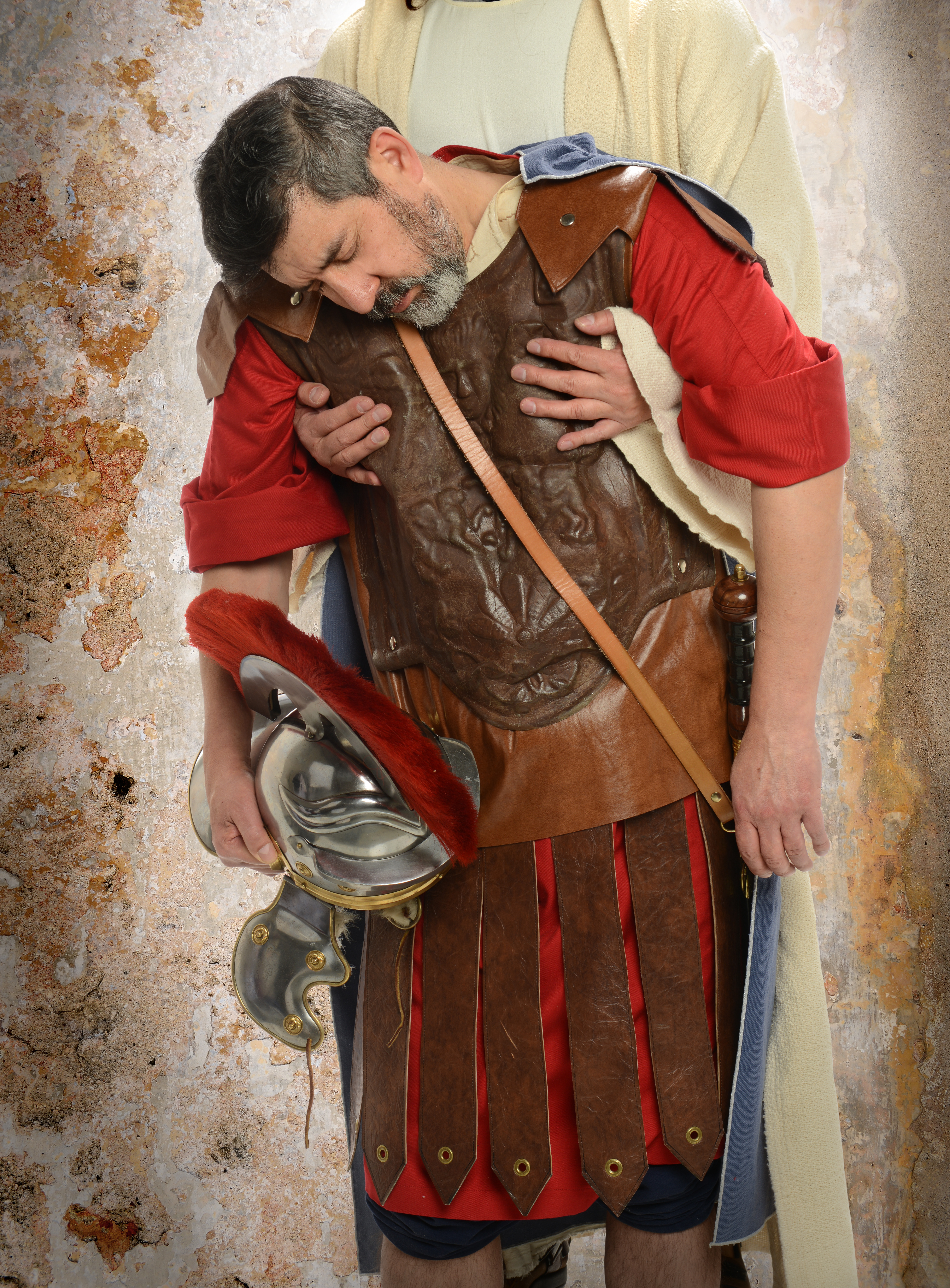 Ponder it carefully. The minds of the Roman soldiers are controlled by Satan, yet the breath by which they live is the life of Christ that “enlightens everyone who comes into the world” (John 1:9). The power of Christ in the souls of mankind is used by Satan to nail Him to the cross. Just stop and ponder that for a moment. The single image of a Roman soldier with hammer held high and driving a spike into those precious hands of the Savior holds the key to the plagues of Egypt and all the power of destruction manifested on the earth. Therefore, we can see that wherever and whenever we witness the suffering of man, we see the suffering of Christ:
Ponder it carefully. The minds of the Roman soldiers are controlled by Satan, yet the breath by which they live is the life of Christ that “enlightens everyone who comes into the world” (John 1:9). The power of Christ in the souls of mankind is used by Satan to nail Him to the cross. Just stop and ponder that for a moment. The single image of a Roman soldier with hammer held high and driving a spike into those precious hands of the Savior holds the key to the plagues of Egypt and all the power of destruction manifested on the earth. Therefore, we can see that wherever and whenever we witness the suffering of man, we see the suffering of Christ:
“In all their affliction He was afflicted, and the angel of His presence saved them: in His love and in His pity He redeemed them; and He bare them, and carried them all the days of old.” (Isaiah 63:9)
Moses had to pick up the serpent by the tail in order for it to be turned back into a rod (Exodus 4:4). In the book of Revelation we read:
“And there appeared another wonder in heaven; and behold a great red dragon, having seven heads and ten horns, and seven crowns upon his heads. And his tail drew the third part of the stars of heaven, and did cast them to the earth … And the great dragon was cast out, that old Serpent, called the Devil, and Satan, which deceiveth the whole world: he was cast out into the earth, and his angels were cast out with him.” (Revelation 12:3, 4, 9)
The tail is a symbol of lies:
“The head is the elder and honorable man, and the tail is the prophet who teaches lies. For those who guide this people mislead them, and those they mislead are swallowed up.” (Isaiah 9:15, 16)
When Moses picked the serpent up by the tail, he was capturing the lies of Satan. This is a symbol of the cross that allowed the power of God to be turned back into a rod that was back in the hands of Moses who represented God.
“For He (God) hath made Him (Jesus) to be sin for us, who knew no sin; that we might be made the righteousness of God in Him.” (2 Corinthians 5:21)
Christ was made to be sin in allowing His power to be placed in the hands of Satan. In order for Satan to have the capacity to reveal his kingdom, the power in Christ was made to serve the wishes of Satan. Therefore, the person of Christ was and is crucified in all the evil angels. His power dwells within them but they crucify His person in their hatred of His character. And so it is with every fallen son and daughter of Adam. Christ is crucified afresh in the souls of those who cherish self over Christ (Hebrews 6:6). In the book of Revelation, John tells us that Jesus was indeed spiritually crucified in Egypt (Revelation 11:8).
This gives us even more clarity as to the meaning of the fiery serpent held up on a pole in the book of Numbers:
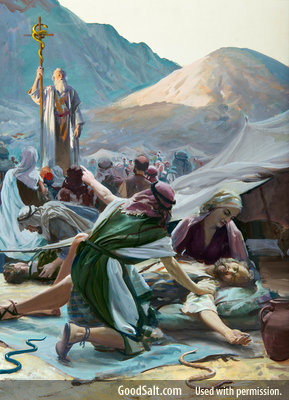 “And the LORD said unto Moses, Make thee a fiery serpent, and set it upon a pole: and it shall come to pass, that every one that is bitten, when he looketh upon it, shall live.” (Numbers 21:8)
“And the LORD said unto Moses, Make thee a fiery serpent, and set it upon a pole: and it shall come to pass, that every one that is bitten, when he looketh upon it, shall live.” (Numbers 21:8)
“And as Moses lifted up the serpent in the wilderness, even so must the Son of man (the Messiah/Jesus) be lifted up.” (John 3:14)
The fiery serpent is the old Serpent called the Devil and Satan (Revelation 12:9). The serpent upon the pole is Satan using the power of Christ to serve his own ends according to his own choice. By giving His Son over to Satan and wicked man, God was taking Satan by his tail, exposing him as the great murderer and liar (John 8:44).
The power of Christ dwelt in all the souls of the Egyptians. The killing of any person requires the torture of the person of Christ. Can you imagine an Egyptian mother holding her dead son bent over his lifeless form sobbing out her agony of spirit? Here Christ is afflicted in her affliction, here the cross is raised, and Christ is crucified afresh. In allowing the Egyptians to die at the hands of the Destroyer, He allowed the agony and suffering of His Son and so the Father stood alone in this darkness and wept for His Son during the plagues of Egypt and for all that His Son wept for.
Moses’ Hand Turns Leprous
God established this truth about the rod with a second miracle:
“And the LORD said furthermore unto him, Put now thine hand into thy bosom. And he put his hand into his bosom: and when he took it out, behold, his hand was leprous as snow.” (Exodus 4:6)
Just as the Son of God is the right hand of the Father, He also dwells in the bosom of the Father:
“No man hath seen God at any time; the only begotten Son, which is in the bosom of the Father, He hath declared him.” (John 1:8)
Remember, Moses is being represented as God for these illustrations. When God reached into His bosom and touched the place where His Son dwelt, His Son was made sin for us. Leprosy is a symbol of sin and the hand in this condition represents the power of Christ without His Spirit (James 2:26). The flesh becomes dead to anything and can’t feel anything. Christ is made numb by the horrors of death and destruction caused by Satan. He is made to drink the bitter sop in agony of spirit.
The agony of Christ and the allusion to the cross is revealed in the first plague. Moses and Aaron were commanded to take the rod that became a serpent which symbolized the power of Christ being given over to the hands of Satan.
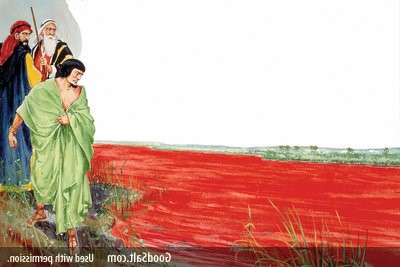 “Go to Pharaoh in the morning, when he goes out to the water, and you shall stand by the river’s bank to meet him; and the rod which was turned to a serpent you shall take in your hand … Then the Lord spoke to Moses, ‘Say to Aaron, Take your rod and stretch out your hand over the waters of Egypt, over their streams, over their rivers, over their ponds, and over all their pools of water, that they may become blood. And there shall be blood throughout all the land of Egypt, both in buckets of wood and pitchers of stone.’” (Exodus 7:15, 19)
“Go to Pharaoh in the morning, when he goes out to the water, and you shall stand by the river’s bank to meet him; and the rod which was turned to a serpent you shall take in your hand … Then the Lord spoke to Moses, ‘Say to Aaron, Take your rod and stretch out your hand over the waters of Egypt, over their streams, over their rivers, over their ponds, and over all their pools of water, that they may become blood. And there shall be blood throughout all the land of Egypt, both in buckets of wood and pitchers of stone.’” (Exodus 7:15, 19)
As Jesus pleaded with His Father in the garden the night before His death, He sweat drops of blood (Luke 22:44). Shortly after this He said to the mob coming to get Him, “this is your hour and the power of darkness” (Luke 22:53). As the rod was lifted over the waters, so Christ was lifted up before the people to be tortured and killed. In Scripture symbolism water represents people (Revelation 17:15) and it also represents the Spirit of Christ (John 7:37-39). As the rod was struck upon the water, so Christ was handed over to Satan. All water turned to blood meaning that throughout the land of Egypt the Spirit of Christ was vexed and tortured in connection with the souls of those men and women. This was not only the Egyptians but also the Israelites. Jesus taught this concept when He said, "Assuredly, I say to you, inasmuch as you did it to one of the least of these My brethren, you did it to Me" (Matthew 25:40). This event also gives an omen of the future cry of God’s people, “His blood be on us and on our children” (Matthew 27:25).
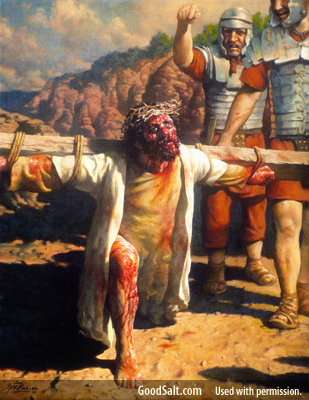 This first plague indicated that God had handed over His Son to allow Satan to begin to destroy the Egyptians through the power that is in Christ. Satan had dragged the Egyptians deep into idolatry and wickedness and their cup of iniquity was fast filling up. Satan had been demanding that they be handed over. They had rejected the wisdom of Joseph and despised the grace of God in saving them from the drought. The great famine in Egypt was a warning that the Spirit of God was being withdrawn because of a refusal to acknowledge the sovereignty of God and His Commandments (Deuteronomy 11:13-17).
This first plague indicated that God had handed over His Son to allow Satan to begin to destroy the Egyptians through the power that is in Christ. Satan had dragged the Egyptians deep into idolatry and wickedness and their cup of iniquity was fast filling up. Satan had been demanding that they be handed over. They had rejected the wisdom of Joseph and despised the grace of God in saving them from the drought. The great famine in Egypt was a warning that the Spirit of God was being withdrawn because of a refusal to acknowledge the sovereignty of God and His Commandments (Deuteronomy 11:13-17).
God Fought to Save the Egyptians
Why were all the firstborn killed in Egypt? They had spiritually crucified Christ, “the Firstborn of all creation” (Colossians 1:15). John tells us that Christ was not only crucified in Jerusalem, but was “spiritually” crucified in “Sodom and Egypt” (Revelation 11:8). Thus their rejection and crucifixion of Christ (the Firstborn of all creation) backfired upon them and opened the way for the destructive evil angel to enter and kill all their firstborn sons. Christ could not help them because they had willfully crucified Him. He did not interfere with their free choice of rejecting their only Source of life. Yes, man “becomes the victim of his own destructive plans” (Psalm 7:16).
Yet in the symbolism of the slain lamb, Christ—"the Lamb of God" (John 1:29; 1 Peter 1:19)— was bearing their sins. Paul wrote that “He (Christ) by the grace of God should taste death for every man” (Hebrews 2:9). Again we read:
“In all their affliction He was afflicted, and the angel of His presence saved them: in His love and in His pity He redeemed them; and He bare them, and carried them all the days of old.” (Isaiah 63:9)
This verse would also apply to both the Egyptians and the Israelites who left Egypt.
Due to the slavery in Egypt, the Sabbath was abandoned by most of the Israelites. If the Israelites had been able to continue keeping the Sabbath, then they would have been like Paul upon the Roman ship that crashed into Malta. They would have given Egypt more time to turn from their wickedness. This is why the request was made for Israel to go and keep a Feast in the wilderness:
"And afterward Moses and Aaron went in, and told Pharaoh, Thus saith the LORD God of Israel, Let My people go, that they may hold a Feast unto Me in the wilderness." (Exodus 5:1)
This request was not a deception to escape the Egyptians. This was a call to come back to the Commandments of God, so that God’s people could begin to intercede for Egypt that they also might turn to God. Moses had already encouraged them to begin keeping the weekly Sabbath Festival:
"And Pharaoh said, Behold, the people of the land now are many, and ye make them rest [שָׁבַת/Shabbat/Sabbath] from their burdens." (Exodus 5:5)
God was now encouraging them to take the next step towards the Sabbath in keeping another Feast. If they had been able to keep this Feast and return, then the plagues could have been averted a little longer. Notice what Moses said to Pharaoh:
"And they said, The God of the Hebrews hath met with us: let us go, we pray thee, three days' journey into the desert, and sacrifice unto the LORD our God; lest He fall upon us with pestilence, or with the sword." (Exodus 5:3)
When the writer uses the phrase "lest He fall upon us with pestilence, or with the sword", he is not saying God will be the cause of this pestilence, but is using a Hebrew idiom which simply means God would give them over to pestilence and drought. In fact, the Septuagint (Greek translation of the Hebrew Scriptures) explains it more clearly, removing any doubt that God is not the cause of the plagues:
“And they say to him, ‘The God of the Hebrews has called us to Him: we will go therefore a three days' journey into the wilderness, that we may sacrifice to the Lord our God, lest at any time death or slaughter happen to us.” (Exodus 5:3; Brenton's Septuagint)
Describing the plagues of Egypt, the Psalmist wrote, "... He spared not their souls from death, but gave their life over to the pestilence" (Psalm 78:50). God didn't cause the pestilence, He gave them over to it according to their free choice of crucifying Christ— their only Protector. (Please see the article entitled, Did God "Pass Over" the Israelites or Stand Guard and "Protect" Them?).
The Lord wanted to save Egypt from destruction. If Pharaoh would give his permission for Israel to keep a Feast, then he would be responsible for the action they took and would therefore benefit from the Feast the Israelites engaged in. This is why God did not simply tell Pharaoh we are leaving. God did not want to leave the Egyptians to the mercy of Satan. He wanted to save them!
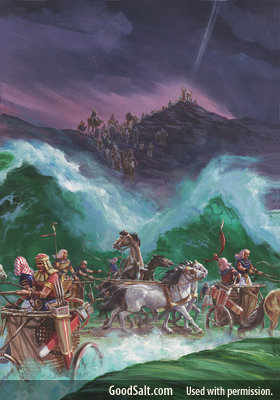 At the time of the plagues of Egypt, God was pleading for their salvation just as much as He was pleading for the Israelites’ salvation. As the Egyptians raced to catch the Israelites as they crossed the sea on dry land, Scripture says:
At the time of the plagues of Egypt, God was pleading for their salvation just as much as He was pleading for the Israelites’ salvation. As the Egyptians raced to catch the Israelites as they crossed the sea on dry land, Scripture says:
“And it came to pass, that in the morning watch the LORD looked unto the host of the Egyptians through the pillar of fire and of the cloud, and troubled the host of the Egyptians, And took off their chariot wheels, that they drave them heavily: so that the Egyptians said, Let us flee from the face of Israel; for the LORD fighteth for them against the Egyptians.” (Exodus 14:24-25)
According to the view of the Egyptians, God was trying to slow them down in order to drown them, but this is not how God’s righteousness works. God was slowing them down in order for them to think twice and turn around so they would not drown. God and His angels were there to save life, not to kill.
In all of these plagues God was pleading for both the Israelites and the Egyptians to turn away from the false gods of Egypt and to trust Him; for “none of them that trust in Him shall be desolate.”

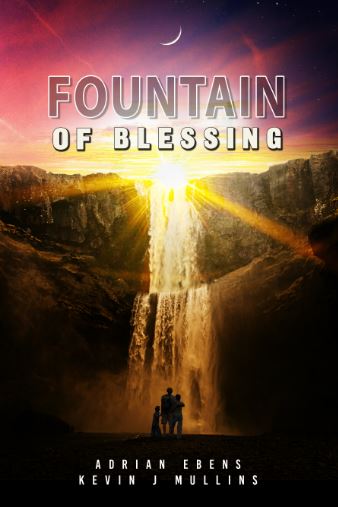
.png)
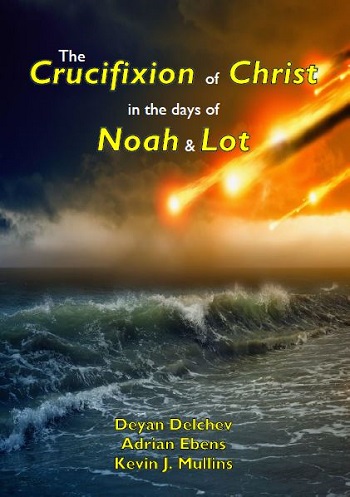
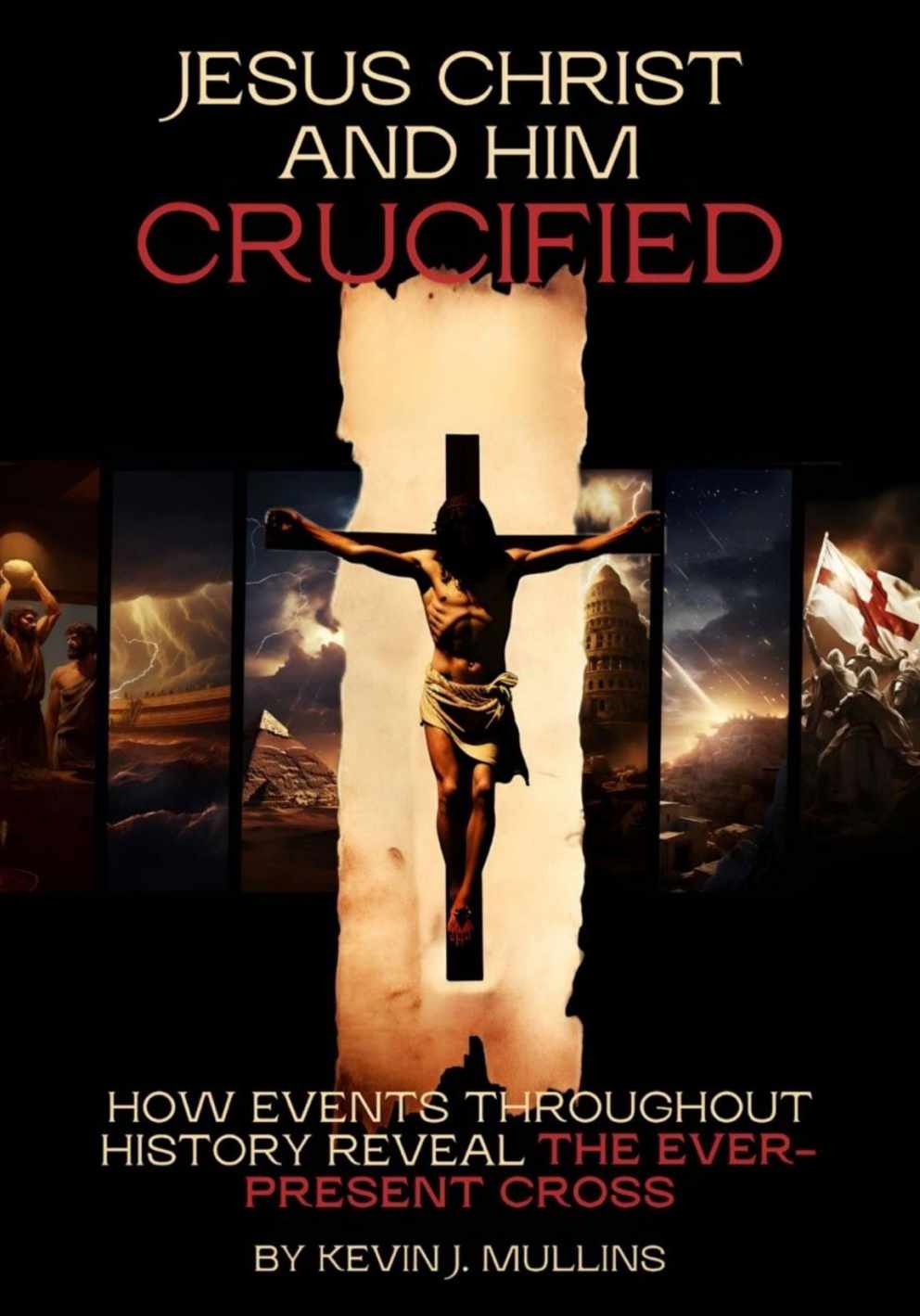
.jpeg)
